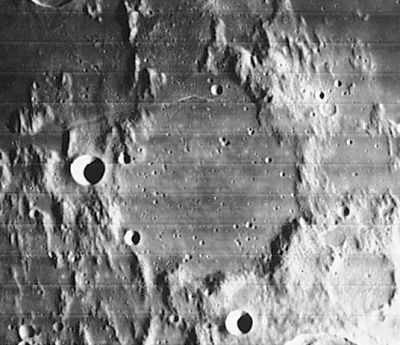Flammarion
Contents
[hide]Flammarion
|
Lat: 3.4°S, Long: 3.7°W, Diam: 74 km, Depth: 1.51 km, Rükl: 44 |
 LOIV-108-H3 The prominent 13-km circular crater to the left of center is Mösting A, and above it a portion of Rima Flammarion is visible.
LOIV-108-H3 The prominent 13-km circular crater to the left of center is Mösting A, and above it a portion of Rima Flammarion is visible.
Images
LPOD Photo Gallery Lunar Orbiter Images Apollo Images
- AS16-M-0848, one of Apollo 16's Mapping Camera photographs of Flammarion and the area southwest of it (between Lalande and Palisa) is included in the book Full Moon by Michael Light and Andrew Chaikin (plate 27).
- Wonderful close ups of Flammarion's floor were made by Lunar Orbiter 3; see frames 116 (with Flammarion D and Mosting A), 117, 118, 119 (part of Flammarion's southeastern rim).
- Earlier close ups of Flammarion's floor were made by Lunar Orbiter 1; see frames 141, 142, 143, and 144.
- Two oblique east-looking Hasselblad photographs made during Apollo 12, which show Herschel (central) and Flammarion (near the lower left corners of both frames): AS12-50-7431 and AS12-50-7432.
- Research Lunar Orbiter and Apollo photographs: Danny Caes
Maps
(LAC zone 77A2) LAC map Geologic map LM map AIC map
Description
Description: Elger
(IAU Directions) FLAMMARION.--A large incomplete walled-plain N.W. of Herschel, open towards the N., with a border rising about 3,000 feet above the floor. The brilliant crater, Mosting A, stands just outside the wall on the W.
Description: Wikipedia
Additional Information
Depth data from Kurt Fisher database
- Westfall, 2000: 1.51 km
- Cherrington, 1969: 2.49 km
Nomenclature
- Named for Camille Flammarion (1842-1925), a French astronomer.
- This name was was introduced on a lunar map published by Gaudibert and Fenet in 1887 (Whitaker, p. 150). The fine print at the top of Gaudibert's map (barely legible on p. 149 of Whitaker's book) appears to say that Gaudibert was working under the direction of Flammarion (whose name appears not only as a new feature name, but also in extra large letters near the top). Mary Blagg's Collated List (1913) indicates that this feature (catalog number 2950) was known to Neison as Herschel f , but was unnamed by her other two authorities. The IAU went with Gaudibert's suggestion in its original Named Lunar Formations (1935). - Jim Mosher
LPOD Articles
Bibliography
Harold Hill. A Portfolio of Lunar Drawings, pages 100, 101 (the Flammarion domes).
Camille Flammarion in the Sourcebook Project (William R. Corliss)
- In Mysterious Universe, a handbook of astronomical anomalies (1979) :
(articles of Flammarion himself)
- Page 58: The Intra-Mercurial Planets (Popular Science Monthly, 1879).
(articles in which Flammarion is mentioned)
- Page 77: Visibility of the Dark Side of Mercury (Leo Brenner, Journal of the British Astronomical Association, 1896).
- Page 172: The Young Moon seen as a Circle (E.A.Stevenson, Journal of the British Astronomical Association, 1918).
- Page 380: The Canals of Mars (E. Walter Maunder, Knowledge, 1894).
- Page 399: Geological Observations of Martian Arroyos (William K. Hartmann, Journal of Geophysical Research, 1974).
- Page 408: Marking on Mars (Journal of the British Astronomical Association, 1900).
- Page 414: Apparent Flashes seen on Mars (Latimer J. Wilson, Popular Astronomy, 1937).